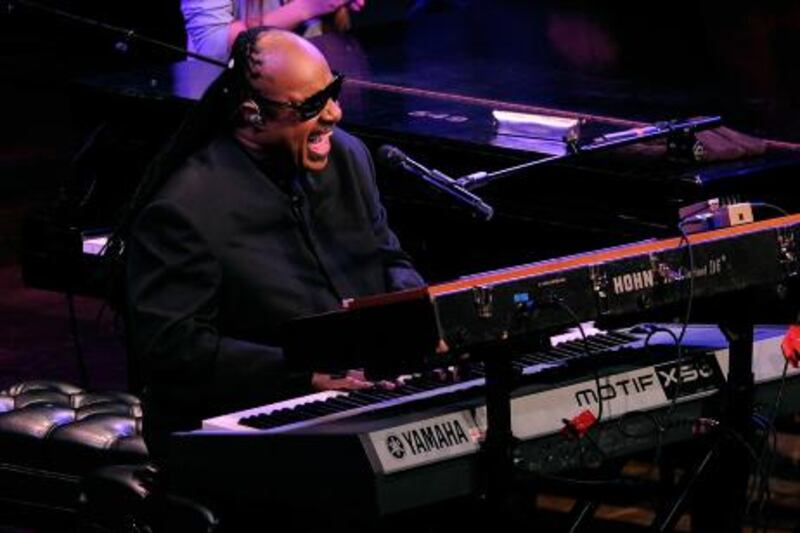Late winter is envelope-opening season in the entertainment industry, with the Grammies, Oscars and Brits all making big headlines. But one recent award nominee was worthier than most. The celebrated New York concert hall The Apollo Theatre announced last month that Stevie Wonder will be the latest inductee into its Hall of Fame, joining many of the biggest names in the history of black music, from Ella Fitzgerald to Michael Jackson. One question does arise, though, given that Wonder began his career on that very stage 50 years ago. Why has he not been inducted already?
Wonder's career provides numerous salutary lessons, not least that crossover success can sometimes adversely affect credibility. The veteran soul artist and activist, who plays his first-ever Middle East concert at Abu Dhabi's Yas Arena tomorrow, has acquired a vast and varied audience since emerging as a child star in the early 1960s. His eminent status has suffered numerous dents along the way, however, and people brought up on his 1980s output can take some convincing about his previous brilliance. But brilliance it certainly was.
One curious aspect of Wonder's career is the clearly definable, decade-by-decade deviations in his work, beginning with the prodigiously perfect pop of the 1960s. Born Stevland Judkins in 1950, Wonder lost his sight as an infant but was soon exhibiting such musical talent that he became a Motown Records priority by the age of 11. Then billed as "Little Stevie Wonder" he proved a pivotal figure in the label's history, going on to record several 1960s classics - I Was Made to Love Her, For Once in My Life, Signed, Sealed, Delivered I'm Yours - and writing hits for others, notably Tears of a Clown for Smokey Robinson and The Spinners' It's a Shame.
Such was Wonder's impact that as the 1970s began he wrested an unprecedented degree of artistic control from Motown, and followed those great early singles with a series of classic LPs. Where his 1960s work generally consisted of catchy love songs, Wonder broadened his musical boundaries with the albums Music of my Mind and Talking Book, then his lyrical themes with 1973's magnificent urban concept album, Innervisions.
Opinions differ as to whether it or the more experimental 1976 double LP Songs in the Key of Life are Wonder's finest record, but this was clearly his golden era, and those albums inspired subsequent generations. Asked to define his own scene in 2002, the Detroit techno innovator Carl Craig suggested that "techno is Stevie Wonder, back when he was doing Innervisions. Because it's a scientific thought process, that soul is input into music."
The dawn of the 1980s saw a dramatic change of direction, however, as a more polished pop sound pushed Wonder up the singles charts but down the album-of-the -year polls he dominated in the 1970s. The achingly sad Lately, from the 1980 album Hotter Than July, remains one of his best-loved songs, but it also signalled the beginning of a more crossover era, and a series of records lacking the inspiration and, perhaps more importantly, soul, of his finest work.
Two infamous singles pushed Wonder firmly into the "uncool" bracket: his 1982 duet with Paul McCartney, Ebony and Ivory, and the monster 1984 hit I Just Called to say I Love You, from the otherwise forgettable movie The Woman in Red. One of the great musical innovators was now churning out cheesy easy listening, and his reputation never fully recovered, among critics at least.
And yet Wonder continued to push a proactive agenda. The mawkish Ebony and Ivory may not have magically engendered racial harmony, but Wonder's support for a dedicated Martin Luther King Day in the US, celebrating the civil rights leader's life, was crucial. The song Happy Birthday, from Hotter Than July, was released to support the campaign, and a Wonder-backed petition gathered six million signatures - still a record in the United States. In 1986 he headlined a huge concert celebrating the first "MLK Day".
The hits dried up as the1980s wound down, but he began the next decade with a partial return to edgy form, penning the soundtrack to Spike Lee's movie Jungle Fever, as his back catalogue found favour with modern artists. The Red Hot Chili Peppers, the British soul crew Incognito and George Michael and Mary J Blige covered songs from Wonder's 1970s heyday, while the rappers Coolio, De La Soul, Warren G and Will Smith sampled various choruses, beats and breaks. Wonder's lawyers also swung into action over the track Step Out by Oasis, which was heavily based on his early classic Up-Tight (Everything's Alright). Whether or not they admitted it, musicians around the world owed a huge debt to Stevie Wonder.
With numerous remakes and reissues refocusing attention on his finest records, Wonder's once-prolific output has slowed considerably, with 1995's Conversation Peace and 2005's A Time to Love his only studio albums of the past two decades. As the world reassessed his career, Wonder reassessed his priorities. "When you're given the gift of music you must also allow yourself to replenish and experience the things you have to do in life," he said at the launch of Conversation Peace. "The many composers of hundreds of years ago didn't have records out every year-and-a-half!"
That might have sounded terribly hubristic from most other artists, but Wonder's canon bears comparison with the greats. Without him in it, a hall of fame is hardly worthy of the name.





